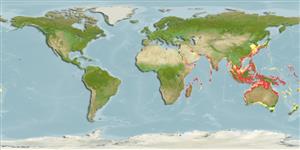Common names from other countries
>
Syngnathiformes (Pipefishes and seahorses) >
Centriscidae (Snipefishes and shrimpfishes) > Centriscinae
Etymology: Centriscus: Derived from Greek, kentris, -idos = sting (Ref. 45335).
More on author: Linnaeus.
Environment: milieu / climate zone / depth range / distribution range
Sinh thái học
Biển; Thuộc về nước lợ Cùng sống ở rạn san hô; Mức độ sâu 2 - 100 m (Ref. 37816), usually 2 - 15 m (Ref. 90102). Tropical; 34°N - 35°S, 32°E - 172°E
Indo-Pacific: Red Sea and Arabian Gulf (Ref. 11441) to New Guinea, north to southern Japan, south to New South Wales, Australia.
Bộ gần gũi / Khối lượng (Trọng lượng) / Age
Maturity: Lm ? range ? - ? cm
Max length : 17.0 cm TL con đực/không giới tính; (Ref. 110387)
Các tia vây lưng cứng (tổng cộng) : 3; Các vây lưng mềm (tổng cộng) : 10 - 12; Tia mềm vây hậu môn: 11 - 12. Silvery with reddish brown to blackish mid-lateral stripe. Main dorsal spine moderately long and without joint (Ref. 48635).
Inhabits sandy or muddy floors of shallow inlet waters. Usually in large schools among branching corals, seawhip gardens and black coral bushes to about 15 m depth. Small juveniles in surface waters and sometimes in small groups along beach edges in quiet bays and settle with crinoids or urchins (Ref. 48635). Usually processed into fishmeal (Ref. 2858).
Life cycle and mating behavior
Maturities | Sự tái sinh sản | Spawnings | Egg(s) | Fecundities | Ấu trùng
Masuda, H., K. Amaoka, C. Araga, T. Uyeno and T. Yoshino, 1984. The fishes of the Japanese Archipelago. Vol. 1. Tokai University Press, Tokyo, Japan. 437 p. (text). (Ref. 559)
IUCN Red List Status (Ref. 130435)
CITES (Ref. 128078)
Not Evaluated
Threat to humans
Harmless
Human uses
Các nghề cá: Tính thương mại; Bể nuôi cá: Tính thương mại
Các công cụ
Special reports
Download XML
Các nguồn internet
Estimates based on models
Preferred temperature (Ref.
115969): 24.8 - 29.3, mean 28.4 (based on 3743 cells).
Phylogenetic diversity index (Ref.
82804): PD
50 = 0.7502 [Uniqueness, from 0.5 = low to 2.0 = high].
Bayesian length-weight: a=0.00282 (0.00106 - 0.00750), b=3.10 (2.86 - 3.34), in cm Total Length, based on LWR estimates for this (Sub)family-body shape (Ref.
93245).
Mức dinh dưỡng (Ref.
69278): 3.3 ±0.4 se; based on size and trophs of closest relatives
Thích nghi nhanh (Ref.
120179): Chiêù cao, thời gian nhân đôi của chủng quần tối thiểu là dưới 15 tháng (Preliminary K or Fecundity.).
Fishing Vulnerability (Ref.
59153): Low vulnerability (10 of 100).
